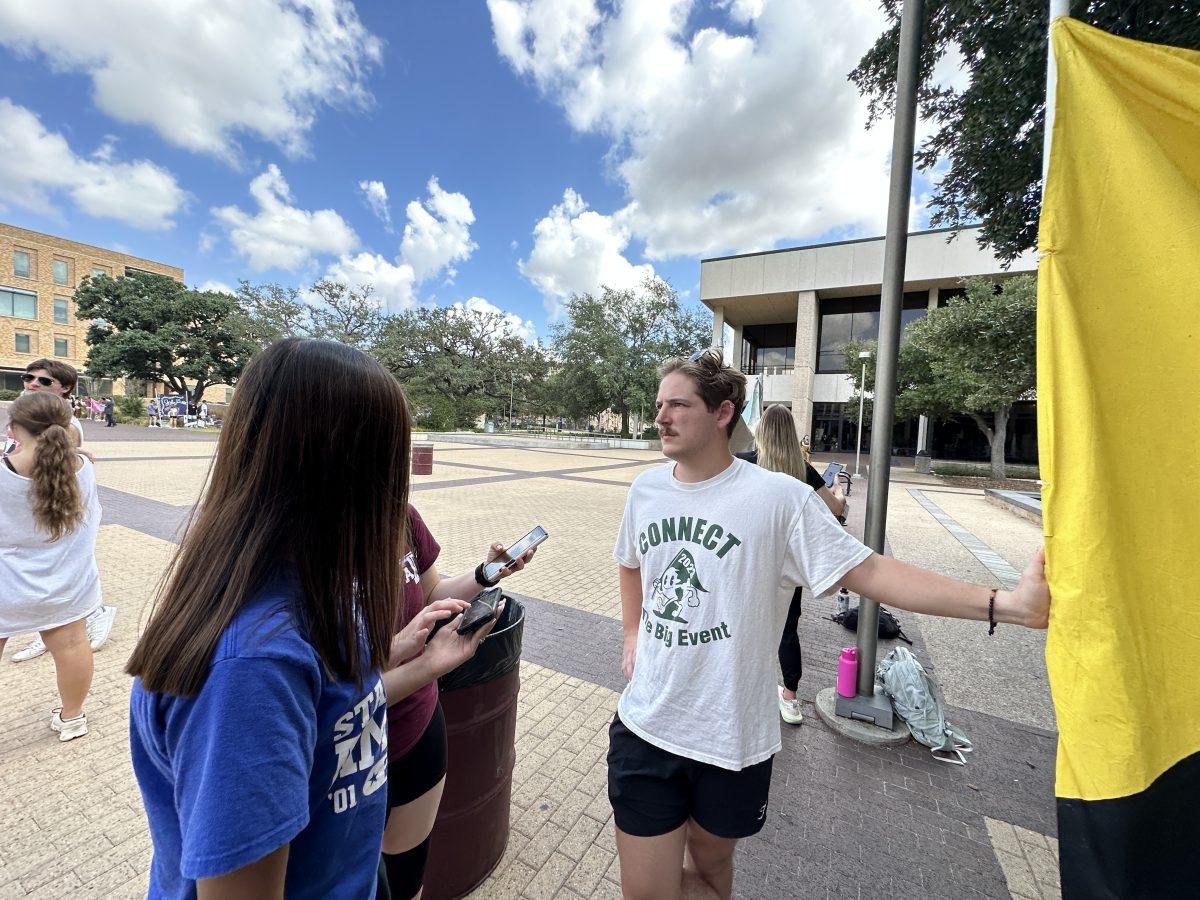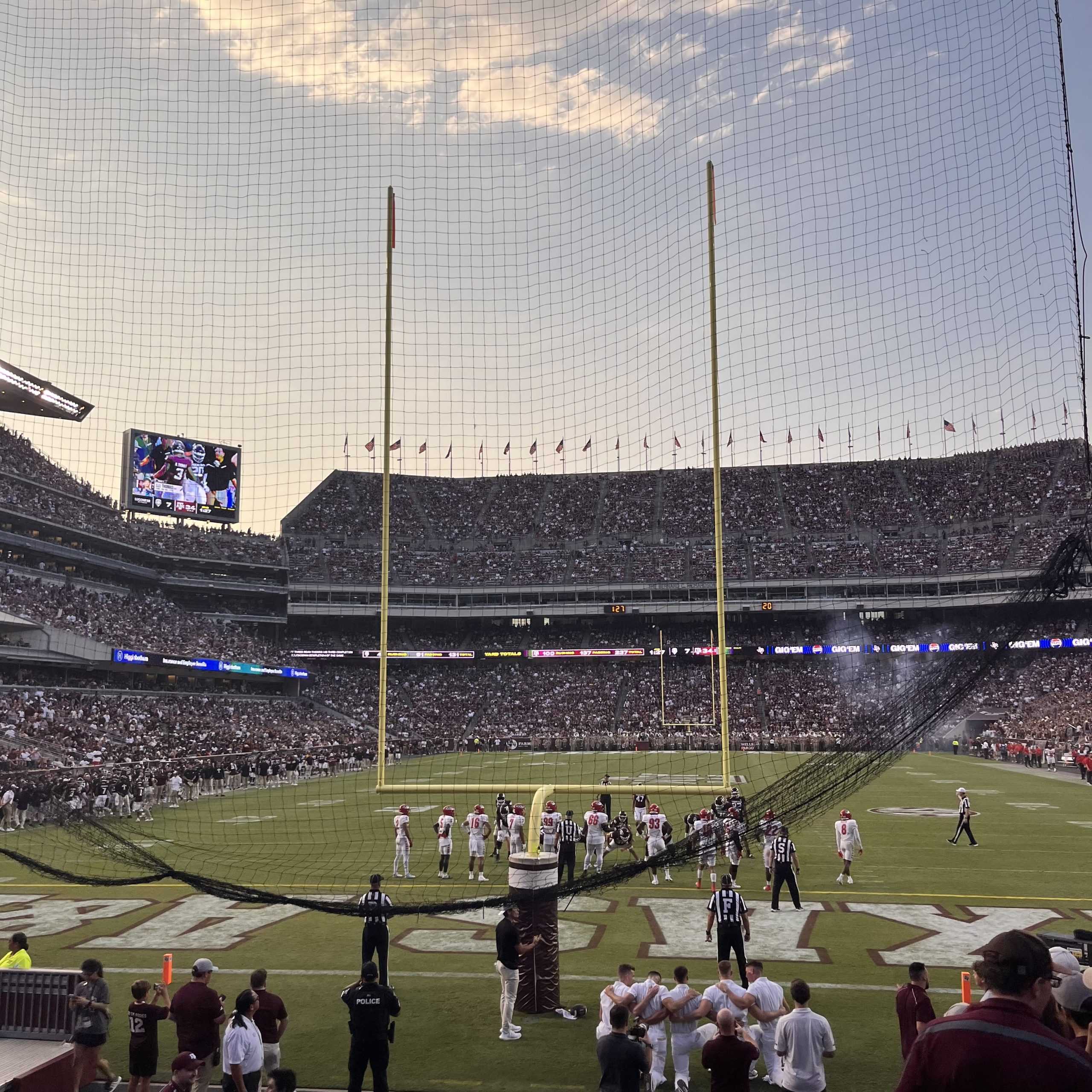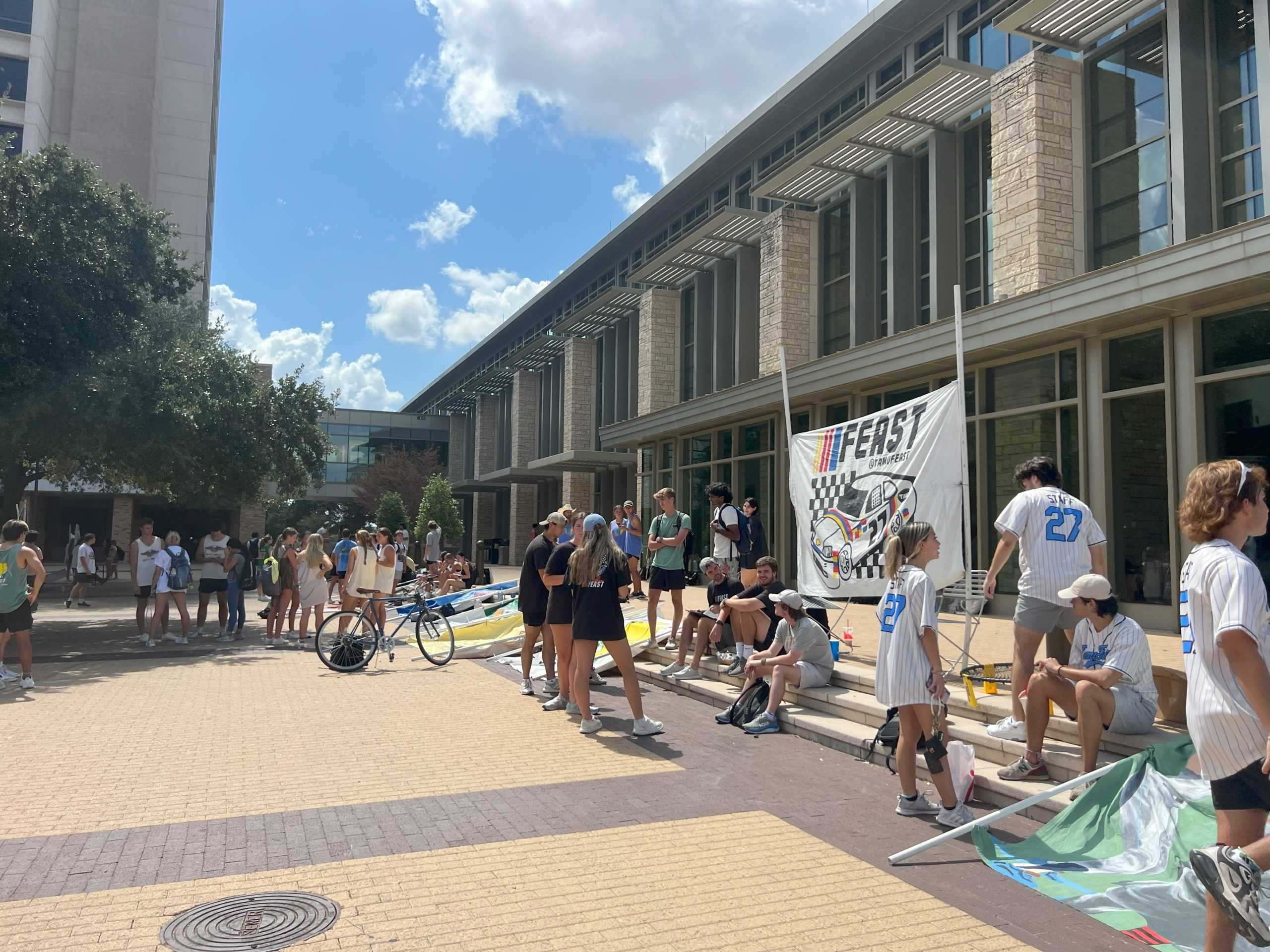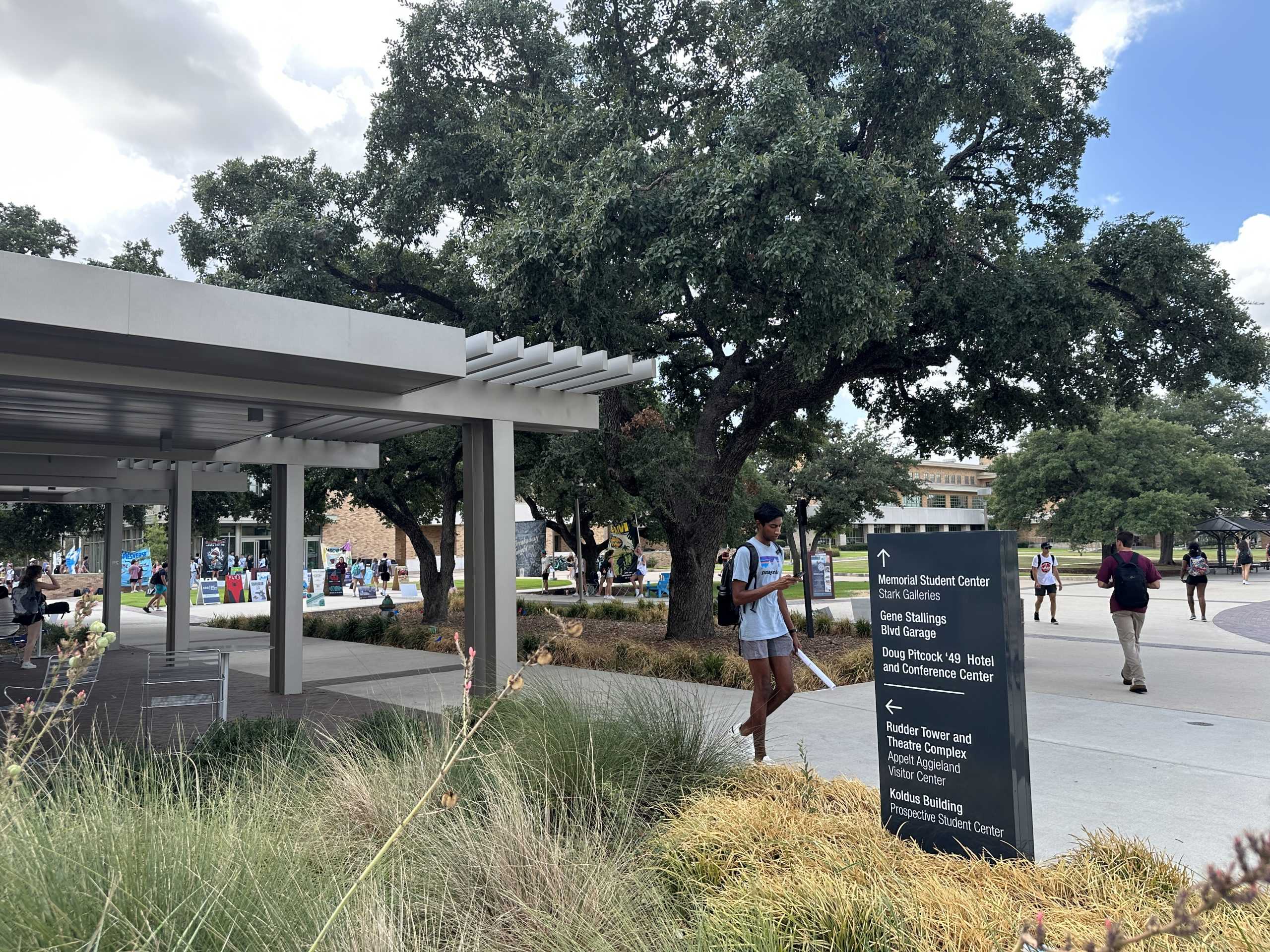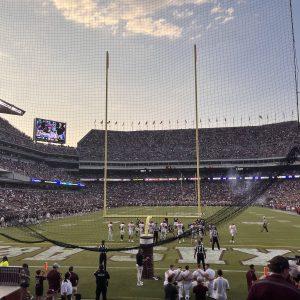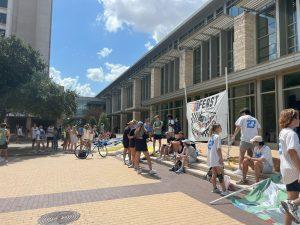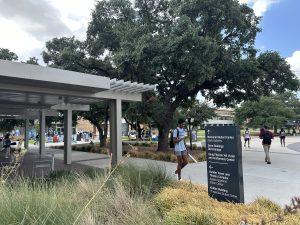From a new campus policy rescinding the right to arrest students in possession of small amounts of marijuana, to fan reactions to the death of Jimmy Buffett, to how prepared some Aggies feel about avoiding a positive COVID-19 test, reporters from JOUR 203 interviewed people around the Memorial Student Center, or MSC, and Rudder Complex on Tuesday, Sept. 5 about how news-making headlines affect Texas A&M students.
The result is Campus voices: Aggie news.
Aggies react to new campus marijuana policy
By Caleb Elizondo, Kaleigh Mazy, Miki Morgan, Valerie Muñoz, Caroline Pinsonat, JOUR 203 901 Contributors
Six Aggies were asked about their reaction to a new university police policy regarding marijuana arrests on campus as well as student-led decriminalization efforts.
University Police Department, or UPD, Chief Mike Johnson informed the Texas A&M Board of Regents that the department would no longer arrest individuals possessing less than two ounces of marijuana at an Aug. 16 board meeting. While marijuana cultivation, possession and distribution are still illegal in Texas, A&M student groups and campus leaders are exploring methods to decrease arrest enforcement efforts for the drug’s possession.
The use of recreational marijuana is legal in 23 states, according to the National Conference of State Legislatures, a nonprofit foundation that informs state legislatures about the most pressing issues nationwide. Under the new policy, UPD will confiscate the marijuana, release the person and then present the case to the county attorney, Johnson said at the meeting.
If the attorney decides to pursue charges, UPD will then make contact. Johnson said the new protocol is intended to better manage department resources and help out-of-state students unfamiliar with Texas law.
Chancellor John Sharp expressed support for the new UPD policy during the meeting.
“[Students are] 18, 20 years old,” Sharp said. “We’ve got to figure out a way to cut them some slack without putting an arrest record on them if they’re not a danger to everybody else, in my opinion.”
All six students interviewed around the MSC on Sept. 5 said they were unaware of the policy change. Management information systems senior Neil Yows said he agreed with Sharp’s statement.
“Marijuana enforcement, especially going as far as to arrest people for just having small amounts on them, has always been a super obtrusive type of policy,” Yows said.
Political science sophomore Aanika Hirode said she was glad the change was made.
“I’m honestly not too informed on it in general, but I think it’s good they’re keeping student’s needs in mind, especially since there’s a lot of stress at the beginning of the term,” Aanika said.
A coalition of A&M student groups is gathering support for a proposal that would bar police officers from arresting residents with under 4 ounces of marijuana while not allowing smell to be used as probable cause to search a vehicle or home and stop marijuana testing.
The groups, including the Cannabis Hemp Innovation League, Aggies for Liberty, Students for Liberty, Students for Sensible Drug Policy and Young Dems BCS are collecting College Station resident signatures for a ballot initiative, according to an April 20 KAGS article.
Biology sophomore Neil Gupta said he also agreed with the policy shift.
“I mean, if you’re using marijuana, it’s going to smell like something,” Gupta said. “But you could also smell like [marijuana] if you’re not using it, just from where you’ve been. So, I think I would definitely be in support of those new policies.”
A&M wide receiver Micah Tease was arrested and charged with a felony and misdemeanor for possession of 48.1 grams of THC edibles and marijuana on Sept. 1, according to The Eagle. After the arrest, A&M announced Tease was suspended per policy.
Four days after the student-athlete’s arrest made headlines, students interviewed said they agreed with reducing punishment for marijuana possession. However, biology sophomore Caleb Falcon said athletic organizations at A&M already are notified of the results of NCAA testing. The NCAA raised acceptable levels of THC in 2022 to be in line with the World Anti-Doping Agency.
“They tell [athletes] before you start that you’re going to get drug tested,” Falcon said. “They do it in the NFL, and they do it for major leagues as well. It’s something that you’re going to do as a professional player and in college.”
Gupta said he thinks it’s important the university has adopted a more “lenient” policy around possessions of smaller amounts of marijuana.
“Obviously, it’s not like we’ve legalized it here or anything,” Gupta said. “But I’m glad to see that the university is putting a foot in the right direction.”
It’s 5 o’clock in Aggieland: Campus reacts to Jimmy Buffett’s death
By Delaney Scott and Richard Hicks, JOUR 203 901 Contributor
With fans stretching across generations, singer-songwriter Jimmy Buffett was remembered on the Texas A&M campus following his family’s announcement of Buffett’s death on Sept. 2.
“Cheeseburger in Paradise” played in tribute over the loudspeakers in Kyle Field during a break in play Saturday evening during the A&M football game against New Mexico. But after building a business empire of music, themed restaurants, retirement homes and even a manatee rescue organization, three Aggies said “Margaritaville” will always be Buffett’s most-known tribute to the island state of mind his music symbolized.
Buffett’s fans, known as parrotheads, often describe themselves as close followers of that lifestyle. Artists provide entertainment — a form of escapism — and celebrity deaths can hit people hard, according to an Oct. 21, 2020 Psychology Today article by Jennifer Lea Reynolds.
Buffett had a rare form of skin cancer, Merkel Cell carcinoma, according to a statement from his family. However, despite undergoing chemotherapy, he continued to perform for four years.
Three Aggies at the MSC on Sept. 5 offered their perspective on Buffett’s legacy, such as general engineering sophomore Josh Kelley.
“He’s an American icon and deserves all the praise,” Kelley said.
His decision to keep performing despite cancer treatment is what impressed kinesiology senior Jenna Lapierre the most, she said.
“I didn’t even know he had cancer,” Lapierre said. “Good job. He really persevered.”
Despite Buffett’s success as a business entrepreneur and humanitarian who co-founded the Save the Manatee Club, Lapierre said she only knew his music.
“Everyone just knows Margaritaville,” Lapierre said.
A fan since Jimmy Buffett’s career took off in 1977, campus visitor Emmert Daudgard said he grew up listening to Buffet. Now in his seventies, Daudgard said music is where Buffett’s legacy will remain.
“No question about it,” Daudgard said. “It was fun music.”
A&M students respond to COVID-19 campus surge
By Andrew Paredes, Jodie Gonzalez, Maryhelen Guerrero, Victoria Taylor, Hannah Morris, JOUR 203 901 Contributors
With a rise in COVID-19 cases reported on the Texas A&M campus, five students were asked how prepared they felt with accessing campus resources, taking precautions against infection and if they wanted to see more COVID-19 data reported amid a current campus surge in cases.
As students headed into their third week of classes, the Texas Department of Health Services weekly surveillance report showed COVID-19 cases increased by 29.7% from Aug. 13-19 compared to the previous weekly report.
COVID-19 has remained top of mind for some since spring of 2020, while others said they were not sure where to access support on campus. Of five Aggies asked where to get tested on campus, only two said they knew the A&M Student Health Center provided tests.
Marketing sophomore Sarah Leonard said she has a good understanding of COVID-19 and how to take precautions.
“I knew coming back to A&M that people would be coming back from everywhere, so I knew I would need to be cautious,” Leonard said.
Communication junior Kelsey Schwartz described herself as “Covid cautious” and said she has continued to be aware of the virus since being back on campus.
“I am fully vaccinated and everything,” Schwartz said. “I feel like I’ve taken the steps I need to keep myself and others safe.”
The cost for a standard COVID-PCR test is $75, according to the A&M Student Health Services website. A few student insurance policies will cover some test costs, but not for all students.
Aerospace engineering senior Madison Miller described $75 as “a little pricey,” but said he would get tested if he thought he might be positive for COVID-19 — however, he said he doesn’t test routinely.
“I know last year, I loved when they were handing out the tests for free because then you can at least get a baseline engaged,” Miller said. “I know there’s a fair margin of error with the at-home tests, but I feel like that was a good solution to that. But it’s definitely expensive.”
An Aug. 28 email sent by University Services Associate Vice President Nancy Fahrenwald, Ph.D., provided students and faculty with COVID-19 campus resource locations and mental health resources. The email noted A&M conducts wastewater testing for COVID-19 prevalence rates on campus, though no specific data or trends were included.
The email did include that free at-home COVID-19 test kits for faculty, staff and students can be picked up at the University Health Services pharmacy in the Student Health Center, Monday-Friday from 8 a.m. to 5 p.m.
Schwartz said she was unaware of the campus wastewater testing but thought it would be helpful for A&M to make that data publicly available.
“I do think it’s valuable information to be shared with all the students, since we’re such a big campus,” Schwartz said. “Things can get bad really fast.”



